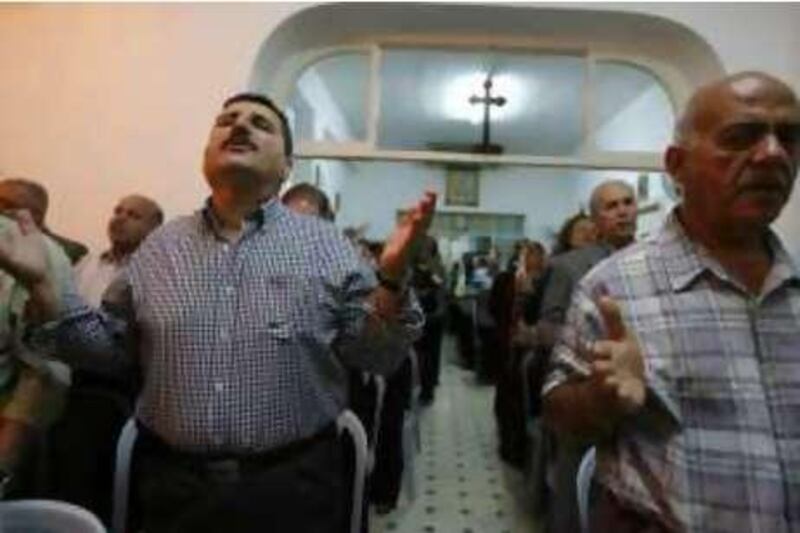AMMAN // Iraqi Christians in Jordan have reacted with outrage and sadness over recent attacks on their community in the north of Iraq that killed at least 12 and forced nearly 10,000 to flee their homes this month. "We pray for those who were killed mercilessly. We pray for Iraq and for Mosul in particular," Remon Moussalli, a Chaldean priest, told a congregation that had gathered at a small church in Amman for an evening mass. On Friday in Geneva, the UN refugee agency said about half of the Christians in Iraq's northern town of Mosul, nearly 10,000 people, had fled after attacks and threats. "This is an orchestrated and ugly campaign against Christians," Fr Moussalli said. "We hear that the families are having tough times; they do not have enough protection. Many were threatened and killed." The spate of attacks, the worst since 2003, underscored the plight of Iraqi Christians, who have become a dwindling minority in their country. Some estimates placed the number of Iraqi Christians at 800,000 at the time of the US-led invasion. But that number has now fallen to about 500,000 because many have left to join families abroad. Most Iraqi Christians are Chaldeans - followers of the eastern Catholic churches that are independent from Rome but recognise the pope. Fr Moussalli estimates that there are 10,000 to 15,000 Iraqi Christians in Jordan. Archbishops are worried that the Christians who have lived in Iraq for the past 2,000 years will soon become extinct. "We felt we were vulnerable. I even stopped going to church two years ago. Our priest was threatened," said Dina Rafael, 37, who came to Jordan from Iraq with her family eight months ago. Ms Rafael is preparing her documents to apply for refugee status with the United Nations High Commissioner for Refugees, hoping to be resettled in the United States where she will join the rest of her family. Ms Rafael believes there is no place for Christians in Iraq anymore. "In the Zayounah neighbourhood in Baghdad where I used to live, there are no more Christians. They have left the country, it has become difficult for us to live [there]. There is no place for us in Iraq anymore. We cannot defend ourselves. "In the lab where I used to work, we were mostly Christians. This past Christmas, I narrowly escaped an explosion when a bomb blew up at the main gate." Despite news that Iraqi security forces have arrested four men in connection with the Mosul attacks, Fr Moussalli said Christians feel they do not have the support of the government in Baghdad. What has made matters worse is the recent scrapping of Article 50 from Iraqi Electoral Law that once guaranteed minorities electoral rights. The quota system provided minorities with a vote; without that right, they now feel discriminated against. "The events in Mosul were unexpected as we thought that things had started to settle down in Iraq. But it seems the violence erupted once the minorities were deprived from their rights in the recent amendment," said Rafat Rafael, Dina's older brother. Jordanian analysts warned that the attacks could spiral and further rent the national fabric of the country, and blamed the continued occupation of Iraq for fomenting sectarian tensions. "This segment of Iraqi people is part of its national Arab and political identity. So those who are targeting them are not murder gangs or explosive experts, but they are part of a project that has been ongoing since the occupation that sought to upset the identity of Iraq," said Samih Maaytah, a columnist with the Alghad daily. The Jordan Bar Association described the attacks as a conspiracy that targeted the unity of the Iraqi people. "The events in Mosul seek to ignite sectarian and ethnic discord in Iraq? the association holds the Zionist-American occupation accountable." As the Chaldeans were singing hymns at the church, Samia, a 39-year-old Iraqi, said she was worried about her sister's brother-in-law in Mosul. "I am worried," she said. "My sister's husband was killed in Baghdad last year and now I am worried that his brother has been killed too. They are killing the Christians. What is our fault? How are we ever supposed to return to our country? If I ever return, I will come back [to Jordan] in a coffin." smaayeh@thenational.ae
In Jordan, prayers for the persecuted
Attacks and threats have forced thousands of Iraqi Christians to abandon their homes and seek refuge abroad.

More from the national




